Books by Dinah Rajak

Under the banner of corporate social responsibility (CSR), corporations have become increasingly ... more Under the banner of corporate social responsibility (CSR), corporations have become increasingly important players in international development. These days, CSR's union of economics and ethics is virtually unquestioned as an antidote to harsh neoliberal reforms and the delinquency of the state, but nothing is straightforward about this apparently win-win formula. Chronicling transnational mining corporation Anglo American's pursuit of CSR, In Good Company explores what lies behind the movement's marriage of moral imperative and market discipline.
From the company's global headquarters to its mineshafts in South Africa, Rajak reveals how CSR enables the corporation to accumulate and exercise power. Interested in CSR's vision of social improvement, Rajak highlights the dependency that the practice generates. This close examination of Africa's largest private sector employer not only brings critical attention to the dangers of corporate dominance, but also provides a lens through which to reflect on the wider global CSR movement.
Papers by Dinah Rajak
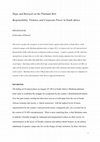
This article considers the resurgence in state-backed violence against mineworkers in South Afric... more This article considers the resurgence in state-backed violence against mineworkers in South Africa, which reached its apogee at the Marikana platinum mines in August 2012, in relation to the rise of Corporate Social Responsibility (CSR) within the post-revolutionary political economy. I explore a paradox of CSR, which has emerged more strongly than ever in the wake of Marikana, whereby mining companies have been able to use CSR to dispense with (rather than fulfil) their social obligations and to externalise (rather than address) their social impact. Operating within an old-school logic of paternalism and benevolence, the practice of CSR is at odds with the discourse of empowerment, upward mobility and worker autonomy that modern mining companies claim to foster. Marikana shows us how CSR paradoxically serves as a resource that empowers companies (in response to their critics and claimants) rather than its supposed beneficiaries.
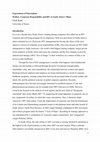
This article focuses on HIV/Aids management at Anglo American (the world’s third biggest mining c... more This article focuses on HIV/Aids management at Anglo American (the world’s third biggest mining company, largest private sector employer in South Africa and across the continent, and the first company to provide antiretroviral therapy ‘free of charge’ to their workforce in a context of little or no access to state healthcare. Through the lens of HIV management, I consider what happens when f human care and welfare is refracted through the prism of corporate managerialism, shareholder value and, more immediately, the relationship between workers and capital. I suggest that, as welfare is conflated with the maintenance of human capital, care becomes a conduit for corporate control and containment giving new force to old paternalistic regimes in the post-apartheid workplace. Here we find the discourse of shareholder value and (human) capital efficiency fused with moralities of social responsibility in this new dispensation of corporate compassion. The result is the emergence of a vanguard of ART recipients, employees who depend on their corporate employers not only for their livelihood, but for their very survival, and are thus divided from society outside the workplace, and from their own dependants. Their liminality comes to embody the disjuncture between corporate responsibility and state welfare.
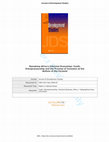
In recent years, the quest for ‘inclusive markets’ that incorporate Africa’s youth has become a k... more In recent years, the quest for ‘inclusive markets’ that incorporate Africa’s youth has become a key focus of national and international development efforts, with so-called bottom of the pyramid (BoP) initiatives increasingly seen as a way to draw the continent’s poor into new networks of global capitalism. SSA has become fertile frontier for such systems, as capital sets its sights on the continents’ vast ‘under-served’ informal economies, harnessing the entrepreneurial mettle of youth to create new markets for a range of products, from solar lanterns and shampoo to cook stoves and sanitary pads. Drawing on ethnographic research with youth entrepreneurs, we trace the processes of individual and collective ‘transformation’ that the mission of (self-) empowerment through entrepreneurship seeks to bring about. We argue that, while such systems are meant to bring those below the poverty line above it, the ‘line’ is reified and reinforced through a range of discursive and strategic practices that actively construct and embed distinctions between the past and the future, valuable and valueless, and the idle and productive in Africa’s informal economies.
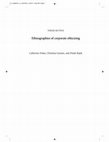
As the global community confronts increasing economic, social, and environmental challenges, the ... more As the global community confronts increasing economic, social, and environmental challenges, the corporate social responsibility (CSR) movement has demonstrated a powerful capacity to offer itself up as a solution, circulating new ethical regimes of accountability and sustainability in business. This article introduces five contributions that explore ethnographically the meanings, practices, and impact of corporate social and environmental responsibility across a range of transnational corporations and geographical locations (India, South Africa, the UK, Chile, and the Democratic Republic of the Congo). In each of these contexts corporations are performing ethics in different ways and to different ends, from the mundane to the ritualistic and from the discursive to the material, drawing a range of actors, interests, and agendas into the moral fold of CSR. Yet across these diverse sites a set of common tensions in the practice and discourse of CSR emerge, as the supposedly "win-win" marriage between the social and the technical, the market and morality, and the natural and the cultural becomes routinized in global management practice. By tracing the connections and conflicts between the local micropolitics of corporate engagement and the global movements of CSR, the collection reveals the ambiguous and shifting nature of CSR and the ways in which social and environmental relations are transformed through the regime of ethical capitalism.
In this chapter I explore the process of conducting a multi-sited ethnographic study tracking the... more In this chapter I explore the process of conducting a multi-sited ethnographic study tracking the discourse and practice of corporate social responsibility (CSR) in the world"s third largest mining company, the Anglo American Corporation; a pursuit which took me from the corporate boardrooms of the company"s HQ in London, to platinum mines of South Africa"s North West Province. As an ethical regime which claims universal applicability CSR, or Corporate Citizenship has generated a maze of global policy instruments and voluntary agreements which, in turn, are seen to give rise to a set of corresponding, localized practices as they elevate corporations as vehicles of social improvement in diverse contexts across the globe.
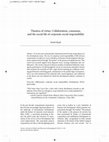
Focaal, Jan 1, 2011
In recent years transnational corporations have become major players in the development arena. Th... more In recent years transnational corporations have become major players in the development arena. The rise of corporate social responsibility (CSR) elevates corporations as leaders in a new orthodoxy of business-led development that promotes empowerment through "the market" as the panacea for global poverty. This vision has recruited support from disparate actors, turning combatants into collaborators. This article is based on thirteen months of multisited fieldwork, tracking the performance of CSR through the circuit of conventions and policy forums that constitute the social life of CSR. I argue that by claiming the confluence of doing good business and doing good, commitment to the market logic of maximisation is not only maintained, but endowed with a moral legitimacy and celebrated as the elusive win-win solution for which the development industry continues to search.
Adventures in Aidland: The Anthropology of …, Jan 1, 2011
The international development industry turns over millions of dollars a year, employing thousands... more The international development industry turns over millions of dollars a year, employing thousands of people. It brings together aid personnel from all over the world, many of them working outside their home countries. For some, these foreign sojourns consist of short, ...
Journal of the Royal Anthropological Institute, Jan 1, 2010
This article is concerned with the moral economy of HIV treatment in a transnational mining compa... more This article is concerned with the moral economy of HIV treatment in a transnational mining company. Based on multi-sited ethnography in the world’s third biggest mining company, I explore how relations between employer and employee are being transformed as a result of corporate HIV programmes, creating connections between the personal realm of sexual conduct and family life and the political economy of global corporate capitalism. I argue that corporate social responsibility serves as a mechanism through which the company consolidates its authority over a particular field of society, in this case its workforce, conflating the exigencies of human care with the interests of capital.
Economics and Morality: Anthropological Approaches, Jan 1, 2007

In recent years, with the advent of the phenomenon known as corporate social responsibility (CSR)... more In recent years, with the advent of the phenomenon known as corporate social responsibility (CSR), transnational corporations have moved away from traditional modes of philanthropic largesse, to a focus on 'community engagement', partnership, empowerment and 'social investment'. This chapter draws on ethnographic research, tracing the practise of CSR in a transnational mining company, from its corporate headquarters in London, to its mining operations on South Africa's platinum belt. It explores how the practices of corporate-community partnership -and the goal of 'self-sustainability' that the company propounds -project the company as a vehicle of empowerment as it strives to convert 'beneficiaries' to the values and virtues of the market with an injunction to 'help yourself' to a piece of 'the market' and share the opportunities that it offers. However, while the promise of CSR holds out this vision of mutual independence and self-sustainability, I argue that the practise of CSR reinscribes older relations of patronage and clientelism
Refereed Papers by Dinah Rajak
Sociological Research Online
This article examines how corporate, state and donor interests have converged in attempts to craf... more This article examines how corporate, state and donor interests have converged in attempts to craft South Africa’s youngsters into an army of entrepreneurs as the last frontier for creating growth in a post-job world. We investigate the apparatus designed to engineer this entrepreneurial revolution and the actors hoping to seed enterprising aspirations in school-age kids. Our ethnographic findings show that while the ideology of entrepreneurial education enrols kids in anticipation of an entrepreneurial future, it falls short of both its enticing promise and its transformative intentions. As enterprise education fails to deliver on the New South African Dream, we argue, the aspirations it propagates withers, generating disaffection rather than a generation of entrepreneurial subjects faithful to the neoliberal creed of making it on your own.









Uploads
Books by Dinah Rajak
From the company's global headquarters to its mineshafts in South Africa, Rajak reveals how CSR enables the corporation to accumulate and exercise power. Interested in CSR's vision of social improvement, Rajak highlights the dependency that the practice generates. This close examination of Africa's largest private sector employer not only brings critical attention to the dangers of corporate dominance, but also provides a lens through which to reflect on the wider global CSR movement.
Papers by Dinah Rajak
Refereed Papers by Dinah Rajak
From the company's global headquarters to its mineshafts in South Africa, Rajak reveals how CSR enables the corporation to accumulate and exercise power. Interested in CSR's vision of social improvement, Rajak highlights the dependency that the practice generates. This close examination of Africa's largest private sector employer not only brings critical attention to the dangers of corporate dominance, but also provides a lens through which to reflect on the wider global CSR movement.